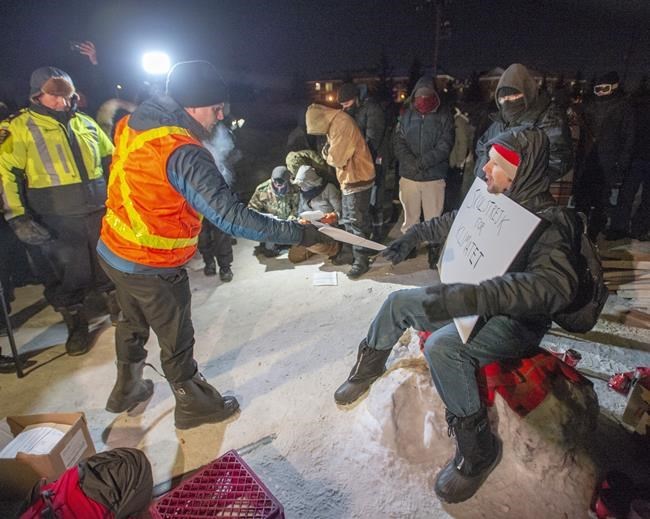ST. JOHN'S, N.L. — As demonstrations continue across Canada in support of Wet'suwet'en hereditary chiefs opposing a pipeline through their territory, legal experts suggest it's time to reconsider how injunctions are employed when responding to Indigenous-led protests.
The protests began earlier this month when the RCMP moved into Wet'suwet'en territory to enforce a court injunction against opponents of Coastal GasLink's natural gas pipeline development in northern British Columbia. A group of hereditary chiefs rejected the court's decision on the company's application, saying it contradicted Wet'suwet'en law.
As solidarity protests popped up on railways and roads across the country, other companies sought their own injunctions to remove the blockades, arguing the demonstrations were causing harm to business and to the Canadian economy.
St. John's-based lawyer Mark Gruchy, who represents clients charged with breaching an injunction while protesting at the Muskrat Falls hydro site in Labrador in 2016, said Indigenous resistance to resource development is too complex an issue to be addressed through injunctions in their current form.
"It's frustrating for me as a lawyer to watch, but I think there's a relatively straightforward way to really take the edge off and to change the future," Gruchy said from Happy Valley-Goose Bay, where five of his clients had just been cleared of criminal charges related to the Muskrat Falls protest. Several other people still face trials or sentencing after being charged for the same incident.
Gruchy said the concerns raised in his clients' case will continue to surface across Canada unless politicians work to "modify the tool" being used to resolve such resource and land disputes.
As an example, he proposed that in cases related to an Indigenous-led protest, injunctions could be structured to allow for mediated consultation instead of a heavy-handed order for the protest to stop.
"This issue, really, is a very sharp collision of a major political, social issue with the legal system, and I think that politicians should do their best to ... blunt the impact of that," he said. The current situation is "not good for ... the long term health of our legal system," he added.
John Borrows, who holds the Canada Research Chair in Indigenous Law at the University of Victoria, said there is a precedent of a legislative solution being employed when injunctions were causing disruption.
In the mid-20th century, the widespread use of injunctions by employers against striking workers was leading to increasingly volatile disputes in British Columbia. The provincial government eventually adjusted labour legislation to outline required negotiation practices in disputes.
"It seems to have created some safety valves or more productive ways of talking through what the dispute is, and so I always wonder whether or not what we learned in other contexts could be applied in this context," Borrows said.
He said injunctions preserve the status quo, because aboriginal title issues do not need to be considered. That causes complications when complex title and governance issues are at stake, as in the Wet'suwet'en case.
B.C. Supreme Court Justice Marguerite Church acknowledged the difficulty of addressing underlying Indigenous law issues in her decision on Coastal GasLink's injunction application, writing "this is not the venue for that analysis, and those are issues that must be determined at trial."
Others have said the legal tests applied when considering an injunction request favour corporations, because financial losses are more easily demonstrated than environmental or cultural ones.
A study of over 100 injunctions published last year by the Yellowhead Institute, a First Nations-led think tank based at Ryerson University, found 76 per cent of injunctions filed by corporations against First Nations were granted, compared with 19 per cent of injunctions filed by First Nations against corporations.
Irina Ceric, a lawyer and criminology instructor at British Columbia's Kwantlen Polytechnic University who worked on the study, said the use of injunctions to dispel protests has been on the rise in Canada. But the last three weeks have been "off the charts," she said, with 12 granted since protests began — more than half of them to the CP and CN railways.
She said the recently granted injunctions raise questions, because in some cases the evidence used in the applications has not been made public, and in other cases it's unclear why mischief laws would not have sufficed.
"I don't know if this is the intent, but what it does is that it gives the corporations that are impacted by these blockades the power to call the shots in terms of protest policing, which I think is really problematic," she said.
Ceric said that rather than waiting for the provinces to introduce legislation, it may take a Supreme Court of Canada challenge to change how injunctions are applied in response to Indigenous protests.
Shiri Pasternak, a criminology professor at Ryerson University and research director of the Yellowhead Institute, said legislators appear to be responding to recent events with more extreme measures rather than reconsidering how injunctions are used.
She pointed to a law introduced in Alberta this week that would heavily fine people who block roads and rail lines and said the recent proliferation of injunctions speaks to their function as a last resort for companies when negotiations with Indigenous leaders break down.
"It's just proving how instrumental this tool is for removing people from their land," she said.
This report by The Canadian Press was first published March 1, 2020.
Holly McKenzie-Sutter, The Canadian Press



